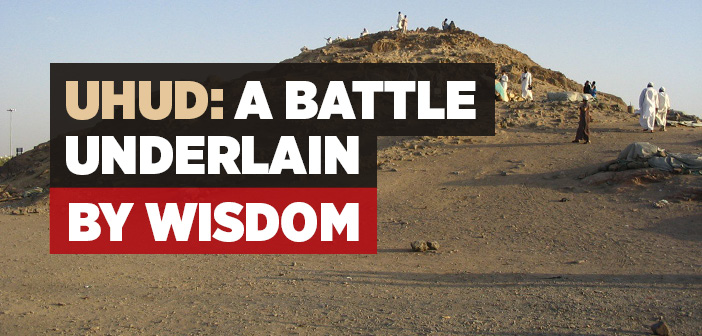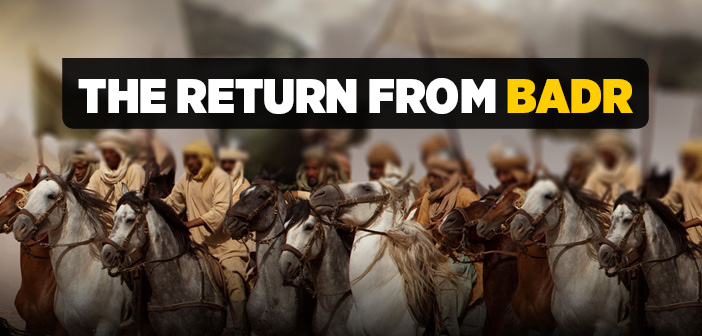What happened in uhud war? Where is uhud?
The Third Year of Hegira: Uhud: A Battle Underlain by Wisdom
Like Badr, the Battle of Uhud[1] was a fierce conflict with the Meccan idolaters, which took place in the third year of Hegira, in the month of Shawwal.
The idolaters of Mecca were overcome with enormous grief following their demise at Badr. All of them had lost someone close in the battle, which only served to aggravate their insatiable desire for vengeance. Burning to settle the scores most was Hind, the wife of Abu Sufyan, the recently instated leader of Quraysh. Soon, they were able to prepare an army of three-thousand idolaters, all of whom were desperately aching for retribution. Goods from the caravan Abu Sufyan had managed to salvage in the lead up to the Battle of Badr were used to fund the army. Neighboring Arab tribes were also called to help.[2]
In the meantime, Abbas, the uncle of the Blessed Prophet -upon him blessings and peace-, informed Medina of the proceedings.[3] The Prophet of Allah -upon him blessings and peace- thereupon immediately gathered the Companions to discuss whether they should remain in Medina and adopt a defensive strategy, or set out from the town as part of an offensive line of attack. The Noble Messenger -upon him blessings and peace- himself wanted to go defensive.[4]
In the end, however, compliant with the desires of the youth too young to take part in Badr, who therefore pleaded on the grounds that ‘they had been waiting for this moment all along’, and with the opinions of other warriors lead by Hamza -Allah be well-pleased with him-, it was decided that they were to meet the idolaters outside of Medina in an offensive.[5]
The Blessed Prophet -upon him blessings and peace- then entered his room and wore his armor. Meanwhile, those wanting to wage a defensive war in Medina, led by Saad ibn Muadh and Usayd ibn Khudayr, had persuaded the others, telling them they were “wrong to insist leaving Medina, when the Blessed Prophet -upon him blessings and peace- wished otherwise. What he is commanded with comes from the heavens; so leave this matter to him, and do as he tells you!” (Waqidi, I, 213-214)
Without wasting time, they rushed to the Blessed Prophet -upon him blessings and peace- and said, “We will never defy your opinion, Messenger of Allah. Do whatever you feel is right!”
But the reply was crystal clear:
“Once he has worn it, a prophet removes his armor only after the battle! You now concern yourselves with doing as I tell you to! Now let’s set out in the name of Allah! If you keep patient and stick to your duties, then Allah the Almighty will grant you victory!” (Waqidi, I, 214; Ibn Sad, II, 38)
Following the Friday salat, leaving Abdullah ibn Maqtum as deputy, the Blessed Prophet -upon him blessings and peace- departed Medina with a thousand man force. But with the turning back of Abdullah ibn Ubayy, the chief hypocrite, with his three hundred men on the way, the number was reduced to seven hundred, consequent upon which Allah, glory unto Him, revealed the following:
“And what befell you on the day when the two armies met (at Uhud) was with Allah’s knowledge, and that He might know the believers. And that He might know the hypocrites; and it was said to them: Come, fight in Allah’s way, or defend yourselves. They said: If we knew fighting, we would certainly have followed you. They were on that day much nearer to unbelief than to belief. They say with their mouths what is not in their hearts, and Allah best knows what they conceal.” (Al Imran, 166-167)
“And when you did go forth early in the morning from your family to lodge the believers in encampments for war and Allah is Hearing, Knowing. When two parties from among you had determined that they should show cowardice, and Allah was the guardian of them both, and in Allah should the believers trust.” (Al Imran, 121-122)
The departure of the hypocrites from the Muslim army proved to be a blessing in disguise, as, far from weakening the army, it served to reinforce and invigorate it spiritually, by virtue of cleansing it from the double dealing, cowardly men. A possible betrayal in the heat of the battle, in hindsight, could have been more disastrous, shaking Muslim confidence.
[1] Uhud is approximately a mile to the north of Medina.[2] Waqidi, I, 199-203.[3] Ibn Saad, II, 37.[4] This was because of a dream the Blessed Prophet -upon him blessings and peace- saw, which he later explained: “In my dream, I was swinging a sword around; its head had been broken off. It turns out that this referred to the troubles the Muslims were inflicted with at Uhud. Then, I swung the sword around once more. The sword was now in a better condition than even before. That referred to the blessing of Allah the Almighty in the form of conquests and gathering the Muslims together. In the same dream, I also saw cattle and another blessing given by Allah. The cattle became manifest in a group of Muslims on the day of Uhud (in their becoming martyred). The blessing I saw became manifest through the conquests Allah gave us following Badr and the rewards Allah blessed us with in return for the perseverance of Badr.” (Bukhari, Tabir, 39, 44; Manaqib, 25; Muslim, Ruya, 20)[5] Ibn Hisham, III, 6-7.
Source: Osman Nuri Topbaş, The Prophet Muhammed Mustafa the Elect II, Erkam Publications





